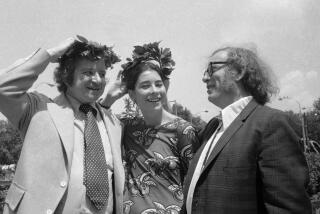C. David Heymann dies at 67; controversial bestselling biographer
C. David Heymann, a bestselling biographer whose titillating accounts of famous lives often were criticized as inaccurate or dishonest, including a book on heiress Barbara Hutton that was recalled because of factual disputes, has died. He was 67.
Heymann died Wednesday after collapsing in the lobby of his New York City apartment building, said his agent, Mel Berger. The cause was believed to be cardiopulmonary failure.
Initially a poet and critic, Heymann wrote books on Ezra Pound and Robert Lowell before turning to popular biography with “Poor Little Rich Girl: The Life and Legend of Barbara Hutton,” published in 1983.
The Hutton book had broad appeal, offering “minute reconstruction” of the life of the Woolworth dime store heiress, who was married seven times and died a nearly penniless recluse in a Beverly Wilshire Hotel suite in 1979. Featured by the Book-of-the-Month Club and excerpted in Vanity Fair, it immediately hit the bestseller list.
But shortly after it arrived in bookstores, a Beverly Hills doctor disputed Heymann’s depiction of him as having prescribed “excessive drugs” to Hutton as early as 1943. The doctor, it turned out, was only 14 in 1943 and did not start treating Hutton until 1969.
That was only one of many problems that surfaced about Heymann’s Hutton research, but it was enough to persuade Random House to recall and destroy nearly 60,000 copies of the 399-page book.
The scandal was far from the end of Heymann’s career, however. He revised the Hutton book and resold it to another publisher. It became the basis for a 1987 TV miniseries, with Farrah Fawcett as Hutton.
Heymann, who once told an interviewer that he liked to write in the nude, went on to produce six more biographies. They included the bestsellers “A Woman Named Jackie” (2000), about the life of Jacqueline Kennedy Onassis; “Liz: An Intimate Biography of Elizabeth Taylor” (1995); and “Bobby and Jackie: A Love Story” (2009), in which Heymann alleged the former first lady and her brother-in-law, Robert F. Kennedy, commenced an affair just months after her husband’s assassination. The books on Onassis and Taylor also were adapted for television.
Though some critics gave Heymann points for assiduous research and engrossing subject matter, others found major flaws, including his reliance on single sources giving accounts of important events they did not witness and on sources who could not be questioned because they were dead.
Controversy also surrounded his first two biographies. Critic Hugh Kenner charged that quotes in “Ezra Pound: The Last Rower” (1976) were lifted from an obscure Italian journal, not obtained by Heymann, who said he had interviewed Pound before he died in 1972. Reviewers said serious errors were rife in “American Aristocracy: The Lives and Times of James Russell, Amy, and Robert Lowell” (1980).
Born in New York City on Jan. 14, 1945, Heymann was the son of a German Jewish novelist who owned hotels after immigrating to the United States in the late 1930s. Heymann studied hotel management at Cornell University, earning a bachelor’s degree in 1966. Finding literature more to his liking, he published a book of poetry in 1968 and obtained a master’s in writing at the University of Massachusetts at Amherst in 1969.
Married three times, he is survived by his wife, Beatrice Schwartz, and two children.
His books on Pound and the Lowells taught him that poetry was not the road to riches.
“Obviously, I couldn’t continue to write literary biography and support a family,” he told the Hartford Courant in 1989. “I don’t mean to suggest I write just for money, but a person does have to make a living.”
More to Read
Start your day right
Sign up for Essential California for the L.A. Times biggest news, features and recommendations in your inbox six days a week.
You may occasionally receive promotional content from the Los Angeles Times.




















































